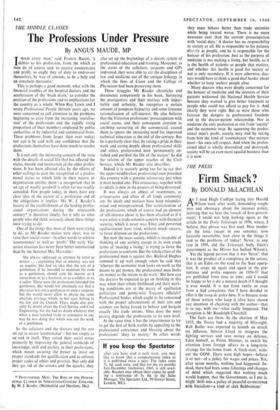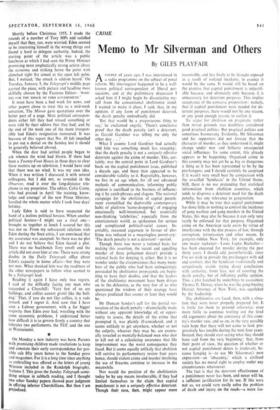Firm Smack?
THE PRESS
By DONALD McLACHLAN
As I read Hugh Cudlipp laying into Harold Wilson week after week, demanding tough- ness and obstinacy about the incomes policy, insisting that we hear the 'smack of firm govern- ment,' I could not help looking again at the article in the Daily Telegraph in 1956, where, I believe, that phrase was first used. How moder- ate the tone, except in one sentence; how basically reasonable; how close in the things it said to the problems of today! Never, at any rate in 1956, did the Telegraph bully Eden's government as the Mirror has bullied Wilson's. Yet the legend persists that it was 'fierce'; that it was the product of a conspiracy in the salons; that it set Eden on the road to the Suez opera- tion. It crops up again and again in the pre- tentious and prolix inquests on 1956-57 that are published from time to time; and I would be happy to let it die a natural death if I thought it ever would. It is not from vanity or even from a bad conscience that I have decided to offer it the coup de grace here. It is because none of those writers who keep it alive have shown any intention of checking with the author—that is to say, with me—what really happened. The exception is Mr Randolph Churchill.
The facts are these. In the election of May 1955, the Tories bad a majority of fifty-eight. Rab Butler was expected to launch an attack on inflation, Selwyn Lloyd to integrate the fighting services and save money on defence, Eden himself, as Prime Minister, to switch his attention from foreign affairs to a long-term strategy for the home front. A 'fresh start,' with- out the GOM. There were high hopes—believe it or not—of a policy for wages and prices. Yet, after seven months, nothing had happened. In- deed, there had been some falterings and changes of mind which suggested that nothing much would happen, that the Government, as I put it, might 'drift into a policy of peaceful co-existence with Socialism—a kind of slick Baldwinism:'
Shortly before Christmas 1955, I made the rounds of a number of Tory MPs and satisfied myself that they, too, were worried. Eden seemed to be interesting himself in the wrong things and found it hard to delegate authority. Indeed, the starting point of the article was a public luncheon at which I had seen the Prime Minister promising most emphatically strong action about the economy and striking home the point with clenched right fist aimed at the open left palm. But, I noticed, 'the smack is seldom heard.' On Tuesday, January 3, the Telegraph's middle page carried the piece, with picture and headline most skilfully chosen by the Features Editor: 'WAIT- ING FOR THE SMACK OF FIRM GOVERNMENT.'
It must have been a bad week for news, and other papers chose to treat this as a mid-week sensation. The Mirror gave quotations over the better part of a page. Most political correspon- dents either felt they had missed something or were told by their editors that they had; and by the end of the week one of the more irrespon- sible had Eden's resignation rumoured. It was because of this report that No. 10 felt impelled to put out a denial on the Sunday lest it should be generally believed abroad.
When the dust had settled people began to ask whence the wind had blown. If there had been a Twenty-Four Hours in those days to clear these matters up on television, I would have said that there was no wind. It was my own idea. When it was written I discussed it with several colleagues, but I did not, as revealed in the Observer, read it over the long-distance tele- phone to my proprietor. The editor, Colin Coote, who had praised in April 'the training, know- ledge and courage' of the new Prime Minister, handled the whole matter while I took four days' holiday.
Lady Eden is said to have suspected the hand of a jealous political hostess. When another political hostess—I might say a rival one— brought us together at lunch I assured her this was not so. From my subsequent relations with Eden during the Suez crisis, I am convinced that my assurance was accepted. So there was no plot and I do not believe that Eden feared a plot. There was no backbench Tory revolt and the article did not even hint at one. There were strong doubts in the Daily Telegraph office about Eden's capacity in home affairs—but they were not new. What shocked him was the readiness of the other newspapers to follow what seemed to be a Telegraph lead.
Reading it again I have only two regrets. I said of the difficulty facing any man who succeeded a Churchill: 'Very few of us are bulldogs, and collies cannot growl like the bull- dog.' That, if you do not like collies, is a rude remark and I regret it. And now that I have seen a Labour government, with a far bigger majority than Eden ever had, wrestling with the same economic problems, I understand better how difficult it is to govern firmly a country that tolerates two parliaments, the TUC and the one at Westminster.
On Monday a new industry was born. Parents with promising children made resolutions to keep and annotate their early correspondence for pos- sible sale fifty years hence to the Sunday press and magazines. For it is a long time since anything so enthralling was offered as the letters of young Winston included in the Randolph biography, Volume I. This gives the Sunday Telegraph some- thing unique in sabbath reading, and I thought two other Sunday papers showed poor judgment in offering inferior Churchilliana. But then I am prejudiced.



































 Previous page
Previous page